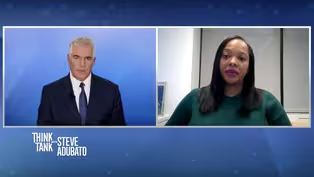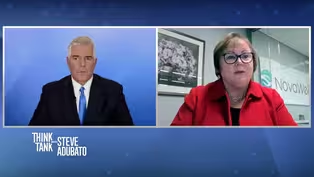
How social determinants of health contribute to disparities
Clip: 3/15/2025 | 9m 29sVideo has Closed Captions
How social determinants of health contribute to disparities
Anita Ramsetty, MD, Director of Health Equity at Englewood Health, sits down with Steve Adubato to discuss how social determinants of health contribute to health disparities.
Problems playing video? | Closed Captioning Feedback
Problems playing video? | Closed Captioning Feedback
Think Tank with Steve Adubato is a local public television program presented by NJ PBS

How social determinants of health contribute to disparities
Clip: 3/15/2025 | 9m 29sVideo has Closed Captions
Anita Ramsetty, MD, Director of Health Equity at Englewood Health, sits down with Steve Adubato to discuss how social determinants of health contribute to health disparities.
Problems playing video? | Closed Captioning Feedback
How to Watch Think Tank with Steve Adubato
Think Tank with Steve Adubato is available to stream on pbs.org and the free PBS App, available on iPhone, Apple TV, Android TV, Android smartphones, Amazon Fire TV, Amazon Fire Tablet, Roku, Samsung Smart TV, and Vizio.
Providing Support for PBS.org
Learn Moreabout PBS online sponsorship- Hi, everyone, Steve Adubato.
We kick off the program with an important healthcare, medical conversation with Dr. Anita Ramsetty, who is an endocrinologist and also Director of Health Equity at Englewood Health, one of our long time healthcare underwriters.
Dr. Ramsetty, great to see you.
- Appreciate it.
Time to talk.
- Yeah, it is time to talk.
Define "Health equity" for us, particularly, as we move into 2025, please.
- Sure.
So, yeah, health equity really has to do with fairness.
I talk a lot to different groups and I often point out, "By the time you get to about 18 years of age, you start to understand that life isn't always fair."
And it's the same with healthcare.
So we assume everyone has the same choices, the same opportunities, the same options, and that's really not the case.
So health equity really has to do with trying to level the playing field as much as possible, so that everybody has a fair chance to be healthy.
- Well said.
Could you tell us and break down this somewhat jargony phrase, "Social determinants of health," please?
- So this became really a lot more prominent over the last several years.
It was slow moving for a while, and then, over the last 10 years, it sort of exploded.
We always, for many years, thought that genetics really dictated how we did health-wise and there were some environmental component.
A lot of people were really into, what's my family history?
This is gonna tell me how healthy I'm gonna be.
And what we've learned in looking at where people live, where they work, where they interact with other people, those are really what the social determinants of health are, anything that's non-genetic is really what it is.
- Such as?
- Such as, the neighborhood that you live in, the job that you have, the education that you've had through your lifetime, the education of your family members.
- How about this?
- Money is really, really important.
Not in the traditional sense that a lot of people think about, but money gets you access to a lot of things, like your insurance, the groceries that you can buy, the transportation that you can afford, and all of those things will impact how you live and work through this world, and how you access healthcare as well.
And so, all of those will impact up to about 80% of your health, which surprises a lot of people.
- Let me ask you.
There are different initiatives at different healthcare organizations, but there is a Family Live Well Center at Englewood.
What's the name of it?
- Shirvan Family Live Well Center, yes.
- And what does it do, and who does it do it for?
- So our Shirvan Family Live Well Center, they're enjoying their one-year anniversary, similar to me, they opened their doors in October of 2024.
And, really, they are embedded in downtown Englewood on purpose, so that we have as much pedestrian and open access as possible within a public setting, it's not in a hospital.
It is essentially a place where people can access health-related classes as well as information that we often recommend to everybody.
There are mental health classes, there are physical health classes, there are maternal health classes, cooking classes, financial literacy classes, things that are open to the public free of charge for you to engage in, at any frequency that you would like.
- It's interesting, Bergen County... (coughs) Excuse me.
Is perceived by many to be one of the wealthier counties in the state and the nation.
- Mm-hmm.
- But there are pockets, pockets in Bergen County, where it's much harder to get access to the quality healthcare people need.
Explain that to folks.
- Now, this is pretty common in many places.
You know, the data that we look at is what I call aggregate.
It's the larger number of everything, it does not include all of the different pockets of neighborhoods, of streets, of districts.
And so, when you see those numbers, it's important to remember that they do not necessarily reflect everybody.
And that's true of any area that you look at, any zip code.
And so, yes, Bergen County is thought to be one of the more affluent areas of the entire country, certainly of New Jersey.
But within those areas, within different cultural pockets, immigration pockets, education pockets, neighborhoods, that predate when people possibly came to this country, or got here, or moved to the area that dictate how well those areas will do.
- So, let's try this.
We've been doing a whole range of work around maternal health.
- Mm-hmm.
- Talk to us about what maternal health really means, and what it really means for those who struggle to get access to the quality maternal healthcare they need.
Please, Doctor.
- There's a lot that goes into maternal health.
So we often think about that as a picture of a pregnant woman, pregnant person not potentially doing well, or having an outcome that's not the best.
And that, unfortunately, sometimes includes babies being born too early, or babies that don't make it after they have delivered, moms that don't make it after they have delivered.
And so, we often think about that.
The important thing to think about with maternal health is that this starts a lot earlier, and we are trying to turn the clock back in terms of what we try to get to.
This should be happening when people are starting periods, when they are teenagers, when they are starting to have relations where it could result in a pregnancy.
And those are critical times where nutrition's important, where education is important, when you need to understand exactly what you're getting into.
Recently, we found out that a number of people didn't really quite understand, well, yeah, after a certain age, you should be taking some supplements so that you have a healthy pregnancy.
Those are things that will affect a maternal outcome as well as the baby's outcome, but they're not widely known.
- Curious about this.
Your passion for this work comes from where?
- Oh (chuckles).
Sadly, it comes from realizing that, after years and years of medical training, which sometimes feels like a hundred years long, that what happened in my clinical office was not what was going to make the biggest difference.
I went through the typical years of college, medical school, my internal medicine training, my endocrinology training, and then had one patient that changed my life forever.
Because, in a conversation with her, I realized, "Okay."
She was eating essentially hot dogs most evenings with her grandson, who was the person that she was taking care of, both parents were not in his life anymore, and that was what she could afford.
She was doing the best that she could, and there was nothing that I could do besides offer her more medication, which would not fix it.
And that changed the course of my professional and personal life forever, because I thought, "What was the good of all of these years of training, if this woman will leave my office with two medications that will not help her.
Her blood pressure's not gonna get better, her diabetes is not gonna get better.
What she needs is support, taking care of her grandson, and better food."
- And so, therefore, you doing the work around health equity at Englewood is intended to impact a larger group of people on a greater scale?
Is that a fair way to say it?
- It is in two parts.
A lot of the work that I do is direct patient, it will directly impact patients.
For example, we try to ensure that everybody is able to make their appointments in ways that they prefer.
Hospitals, including ours, would love digital access for everybody.
Sounds great.
Not everybody has a cell phone, not everybody wants digital access, not everybody knows how to use it, not everybody can do it with their fingers.
So I'm trying to make sure that, when we're doing that, no patients are left out.
At the same time, there's a second half, which is making sure all of my colleagues, all of the medical staff also understands our limitations, and that we can adapt what we offer to patients so that it makes sense.
I used to tell the medical students that I taught, "You can't recommend salmon and quinoa to all of our patients with diabetes.
They can't always afford it.
It sounds great, but that's not practical.
So you need to think outside the box, and see what patients can do."
- Dr. Anita Ramsetty making a difference every day, Director of Health Equity at Englewood Health.
Doctor, thank you so much for joining us.
- Thank you very much for having me.
I appreciate your time.
- We appreciate your time.
Stay with us, we'll be right back.
- [Narrator] Think Tank with Steve Adubato is a production of the Caucus Educational Corporation.
Funding has been provided by Robert Wood Johnson Foundation.
Valley Bank.
The Turrell Fund, a foundation serving children.
Kean University.
New Jersey Sharing Network.
PSEG Foundation.
The North Ward Center.
PSE&G.
Powering progress.
And by NJ Best, New Jersey’s five-two-nine college savings plan.
Promotional support provided by NJBIZ.
And by NJ.Com.
- If you register as an organ donor, you have the potential of saving up to eight lives.
- My neighbor passed away.
His eyes were actually donated and that person now can see.
- Not only can you save a life, but if something should happen to me and I'm no longer here, I know that in some small part I'll live on in someone else.
- Say yes, save lives.
- Say yes, save lives.
- Say yes, save lives.
- Be an organ and tissue donor.
How growing cannabis could fuel the economy in New Jersey
Video has Closed Captions
Clip: 3/15/2025 | 9m 5s | How growing cannabis could fuel the economy in New Jersey (9m 5s)
Integrating physical & behavioral health for better outcomes
Video has Closed Captions
Clip: 3/15/2025 | 8m 44s | Integrating physical & behavioral health for better outcomes (8m 44s)
Providing Support for PBS.org
Learn Moreabout PBS online sponsorship
- News and Public Affairs

Top journalists deliver compelling original analysis of the hour's headlines.

- News and Public Affairs

FRONTLINE is investigative journalism that questions, explains and changes our world.












Support for PBS provided by:
Think Tank with Steve Adubato is a local public television program presented by NJ PBS

